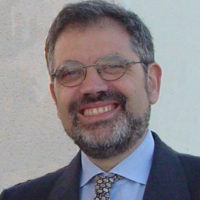
Charles Reich (William K. Sacco/Yale University)
Autumn 2010 is a time of disillusionment for many who deplore the USA’s current political trajectory. Some who’ve been active for progressive causes are now gravitating toward hope that individual actions — in tandem with higher consciousness, more down-to-earth lifestyles and healthy cultural alternatives — can succeed where social activism has failed. It’s an old story that is also new.
From economic inequities to global warming to war, the nation’s power centers have repulsed those who recognize the urgency of confronting such crises head-on. High unemployment has become the new normal. Top officials in Washington have taken a dive on climate change. The warfare state is going great guns.
When social movements seem to be no match for a destructive status quo, people are apt to look around for alternative strategies. One of the big ones involves pursuing individual transformations as keys to social change. Forty years ago, such an approach became all the rage — boosted by a long essay that made a huge splash in The New Yorker magazine just before a longer version became a smash bestseller.
The book was
The Greening of America, by a Yale University Law School teacher named Charles Reich. In the early fall of 1970, it created a sensation. Today, let’s consider it as a distant mirror that reflects some similar present-day illusions.
On the front cover of “The Greening of America,” big type proclaimed: “There is a revolution coming. It will not be like revolutions of the past. It will originate with the individual and with culture, and it will change the political structure only as its final act.”
That autumn, I was upbeat about Reich’s new book — including its great enthusiasm for “the revolution of the new generation.” (Hey, that was me and my friends!) The book condemned the war, denounced the overcapitalized Corporate State, panned the rigidity of schools, lauded the sensuality that marijuana was aiding, and dismissed as pathetically venal the liberalism that had driven the country to war in Vietnam.
At the time, I scarcely picked up on the fact that “The Greening of America” was purposely nonpolitical. Its crux was personal and cultural liberation — in a word, “consciousness,” which “plays the key role in the shaping of society.” And so, “The revolution must be cultural. For culture controls the economic and political machine, not vice versa.” In effect, the author maintained, culture would be a silver bullet, able to bring down the otherwise intractable death machine.
Let’s freeze frame those two dreamy claims and mull them over. Consciousness “plays the key role in the shaping of society.” And culture “controls the economic and political machine, not vice versa.”
Reich combined those outsize tributes to “consciousness” and “culture” with disdain for some plodding struggles. “The political activists have had their day and have been given their chance,” he wrote. “They ask for still more activism, still more dedication, still more self-sacrifice, believing more of the same bad medicine is needed, saying their cure has not yet been tested. It is time to realize that this form of activism merely affirms the State. Must we wait for fascism before we realize that political activism has failed?”
In his 1970 book, Reich laid it on the line: “The great error of our times has been the belief in structural or institutional solutions. The enemy is within each of us; so long as that is true, one structure is as bad as another.” And Reich added a fanciful theory of “liberation” that would leave behind the corporate liberal constraints of the era.
Liberation, he wrote, “comes into being the moment the individual frees himself from automatic acceptance of the imperatives of society and the false consciousness which society imposes.” His optimism sprang from the belief that “the whole Corporate State rests upon nothing but consciousness. When consciousness changes, its soldiers will refuse to fight, its police will rebel, its bureaucrats will stop their work, its jailers will open the bars. Nothing can stop the power of consciousness.”
Fast forward a quarter century.
In 1995, the same Charles Reich was out with another book —
Opposing the System — his first in two decades. Gone were the claims that meaningful structural change would come only as a final step after people got their heads and culture together. Instead, the book focused on the melded power of huge corporations and the U.S. government.
Reich’s new book was as ignored as “The Greening of America” had been ballyhooed; no high-profile excerpt in The New Yorker or any other magazine, scant publicity, and not even faint controversy. Few media outlets bothered to review “Opposing the System.” A notable exception, the New York Times, trashed the book.
In his 1995 book, Reich challenged what he called “the System” — “a merger of governmental, corporate, and media power into a managerial entity more powerful by reason of technology, organization, and control of livelihood than any previously known form of rule.” Reich astutely noted that “we deny and repress the fact of corporate governmental power,” and he pointed out: “There will be no relief from either economic insecurity or human breakdown until we recognize that uncontrolled economic forces create conflict, not well-being.”
In sharp contrast to his flat assertion a quarter century earlier that “the whole Corporate State rests upon nothing but consciousness,” Reich now emphasized the egregious imbalances of financial power: “It is economic deprivation that comes first, dysfunctional behavior second, in the true cause-and-effect sequence.”
The author saw a much fuller social context for the yearning and euphoria that had animated “The Greening of America” and the era it celebrated to excess in 1970. Far wiser in 1995, he wrote: “Most of the important things in life, the things we truly desire, such as love, joy, and beauty, lie in a realm beyond the economic. What we do not recognize is how economics has become the destroyer of our hopes. It is economic tyranny that cuts off our view of a better future.”

Today, even more, we live in a time of economic tyranny. The mantra of “hope” has proven hollow when directed toward a political leader; some react to disappointment by pinning their hopes on individual consciousness or cultural transformations. But deep patterns of economic predation, ecological destruction and endless warfare cannot be effectively undermined by transcendent consciousness or cultural radicalism. Realistic hope is not in a political star or in the mere transformation of our individual selves. Our best strategies and our futures are bound together with political engagement that embraces all of humanity.
Norman Solomon
Book REVIEW / NONFICTION :



























